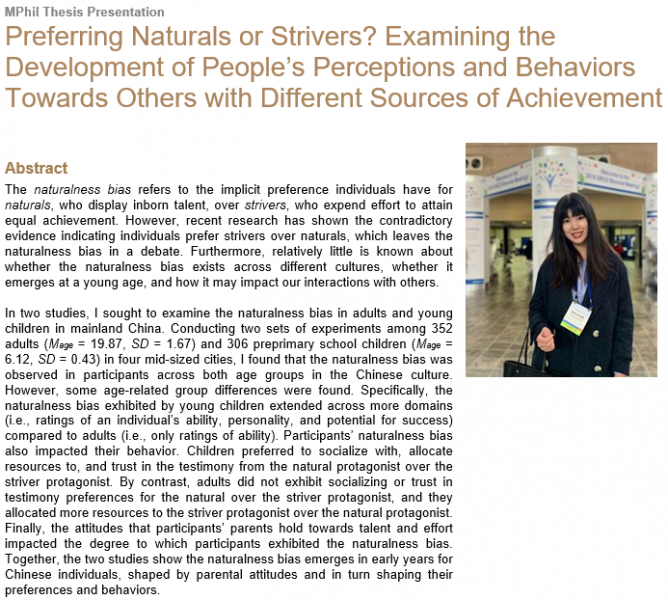Abstract
The naturalness bias refers to the implicit preference individuals have for naturals, who display inborn talent, over strivers, who expend effort to attain equal achievement. However, recent research has shown the contradictory evidence indicating individuals prefer strivers over naturals, which leaves the naturalness bias in a debate. Furthermore, relatively little is known about whether the naturalness bias exists across different cultures, whether it emerges at a young age, and how it may impact our interactions with others.
In two studies, I sought to examine the naturalness bias in adults and young children in mainland China. Conducting two sets of experiments among 352 adults (Mage = 19.87, SD = 1.67) and 306 preprimary school children (Mage = 6.12, SD = 0.43) in four mid-sized cities, I found that the naturalness bias was observed in participants across both age groups in the Chinese culture. However, some age-related group differences were found. Specifically, the naturalness bias exhibited by young children extended across more domains (i.e., ratings of an individual’s ability, personality, and potential for success) compared to adults (i.e., only ratings of ability). Participants’ naturalness bias also impacted their behavior. Children preferred to socialize with, allocate resources to, and trust in the testimony from the natural protagonist over the striver protagonist. By contrast, adults did not exhibit socializing or trust in testimony preferences for the natural over the striver protagonist, and they allocated more resources to the striver protagonist over the natural protagonist. Finally, the attitudes that participants’ parents hold towards talent and effort impacted the degree to which participants exhibited the naturalness bias. Together, the two studies show the naturalness bias emerges in early years for Chinese individuals, shaped by parental attitudes and in turn shaping their preferences and behaviors.

